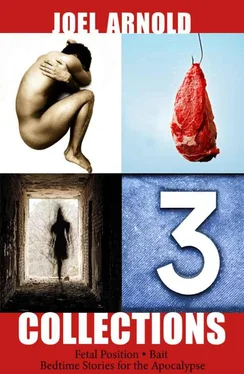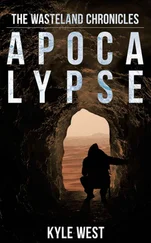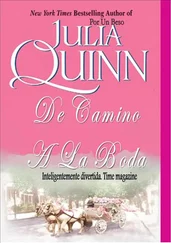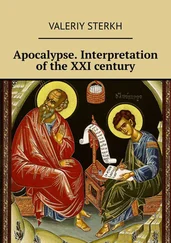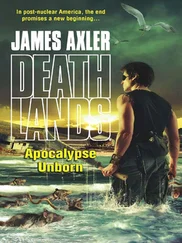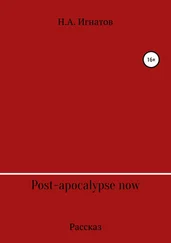“Jill?”
She didn’t answer.
“Jill? Wake up!”
I clicked on The House of Platinum link. Instead of the website, an error message popped up informing me that the site no longer existed.
I hit the back button. Hit reload.
One hit.
Me.
“Jill!”
I looked out the window. The blue haze rolled up gently to the highway that wound past our house. Concrete crumbled and dissolved as the haze drifted over it.
“Jill, damn it, wake up!”
Where was the smoke and dust? The sounds of explosions? Screams? Where was the fire and brimstone and the blare of Gabriel’s trumpet? Where, oh God, where is Jill?
It’s so quiet. Peaceful. Beautiful. The fog laps at the foundation of our house like a playful kitten. It rises softly. Quietly. Reminds me of cotton candy.
I keep staring at my reflection in the blank computer screen. Once I put down this pen, it’ll be all I have left.
The children gathered at the fence of the corral, jockeying for position as the cowhands separated the calves from their mothers. The calves bawled, jumped and kicked to the amusement of the students, while their mothers groaned with eyes rolling wildly and milk dripping from their teats onto the dusty ground.
My class had three children who stayed home that day, which was better than previous years. The first year we took a field trip to Culver’s Farm, only nineteen of my thirty-four third-graders attended. Parents retain the right to keep their kids home on branding day, but they seem to have grown more tolerant of the excursion. I think it’s a good way for the kids to see how the world works. And hell, any reason to get out of the city, with its gray skies, buildings and sidewalks, and into the fresh air of farm country is good enough for me.
All three third-grade classes from Lincoln Elementary were there, as well as the third graders from Roosevelt and Martin Luther King elementary schools. A lot of kids, and it was already a hot day.
I passed out popsicles and bottled water to the children in my class. Even though we had to pay for these out of our own pockets, I felt it was the least I could do. Most of the other teachers did the same, except Ms. Durphy, also from Lincoln, who filled up plastic gallon milk jugs with lukewarm tap water. I felt sorry for her students. They eyed our fruit-flavored popsicles with longing. I wished I’d brought enough for her class, but that would be an affront to Durphy’s authority. She was one of those gems who took out her personal problems on her class and passed it off as a way to get through to them. Frankly, I think all she needed was another bull dyke to come along and give her a couple good nights with a strap-on. Might put her in a better mood for a few days.
I waved at her when she glanced my way. “Morning, Janet.”
She nodded curtly, her eyes narrowed. She hated it when I didn’t address her as Ms. Durphy in front of the kids. As if they gave a shit. I encourage my class from the get-go to call me Ben. If you want to get through to the kids, show them some respect.
A student of mine tugged at my shirtsleeve. Tim Crocker. “Does it hurt?”
I put my hand on his shoulder and squatted. “Remember what we talked about in class? It doesn’t really hurt. Maybe for a little while, but they have thick hides.”
He looked nervous, as if a handful of bees buzzed around his frizzy black hair.
“It’s like when you get a shot,” I said. “A little sting, and that’s it.” I gave him a pat. “Okay?”
He looked me in the eye, trying to find a lie in there somewhere, then nodded. “Okay. I guess.”
Good enough for me.
“Ben?” It was Cal Sellers, the third of our trio of teachers from Lincoln.
“Hey, Cal. How’s it going?”
He bit off the end of a grape Popsicle and looked out at the dust rising in the corral. “Fine,” he said. Then he shook his head. “I hate these days. Wish I could stay home. Call in a sub.”
“Why don’t you?”
He glanced up at me, blinking from the hot sun. “Why don’t I what? Call in a sub?” He squinted at the enthralled faces of his students as they watched the events unfold in the corral. “I’d feel like I’m shirking my responsibility. You know? I mean, I spend one hell of a lot of time gaining their trust, and if I didn’t show up on today of all days…”
Good old Cal. Even on a day like today, he wore a shirt and tie, trousers, good shoes whose polished sheen was already coated with dirt.
As for myself, I’d opted years ago for jeans, a flannel shirt and shit-kicker boots for branding day. This was a farm, not an art museum.
“I better check on Culver,” I said. “Make sure the kids are behaving.”
Cal nodded. “I’ll hold down the fort here.”
Good boy, Cal.
I walked through the children huddled up to the corral fence. A wave of excited chatter arose, and I saw that the first calf had been roped by the hind legs and pulled to the fire. Two cowboys wrestled it to the ground, while a third untied its legs and held onto them. One of the cowboys who’d tackled the calf knelt on its neck, while the other pulled a brand out of the fire and pressed it to the bawling calf’s flank.
I heard groans, cheers and hoots. I heard a child wretch, followed by a slew of voices saying “Eeew!” and “Gross!” but when I looked toward the perpetrator, Cal was already next to her, wiping at the poor girl’s mouth with his handkerchief. I headed over to the barn.
The barn was big and red and had stood for seventy-eight years, raised by Bertrand Culver’s father and a host of neighboring farmers. There’d been a big celebration the day of the raising, and Mrs. Culver proudly showed anyone who cared to look an album brimming with black and white photos of the event.
As I entered, I felt like Jonah being swallowed by the whale as I moved from bright sun to deep shadow. My eyes adjusted quickly, and I sucked in a sweet lungful of hay dust and cattle smells. Soft strands of sunlight spooled from fractures in the roof and walls.
We let in ten children at a time while the branding went on outside. They huddled around Bertrand Culver — current patriarch of the Culver family and all-around head honcho of the farm. He held up a branding iron of cold, black steel, and let the kids inspect, touch and pass it around.
I stopped just outside the circle of children and listened to his soft, gravelly voice.
“Every farm has their different brand,” Culver told them. “Their different mark. Back in the old days, there weren’t the fences like there are today, so we branded cattle in case one of our cows wandered onto someone else’s land. That way, we could tell whose cows belonged to who.”
I got his attention with a nod and a smile. “Mr. Culver, how’s everyone behaving today?”
He winked, the wrinkles around his eyes and mouth stretching. “Just fine, Ben. Haven’t had to whup one, yet.”
Some of the kids giggled.
He passed along another brand. He’d acquired quite a collection over the years from auctions and antique stores. His own mark was a stylized CFF, or C double F, which stood simply for Culver Family Farm.
Jennifer Bately, one of my smartest students, raised her hand.
Culver nodded. “Yes, m’am?”
She pointed to an area behind him. “What are those ones for? Why are they smaller?”
Culver looked over his shoulder and adjusted his black cowboy hat. He smiled at Jennifer. “We’ll talk about those next. But let’s get back to what I was saying.” One of the brands passed around the circle came back to him. He held it like a riding crop. “Another reason we branded was ‘cause of cattle rustlers. It was a lot easier to get our cattle back if they were marked.”
Читать дальше
